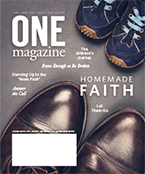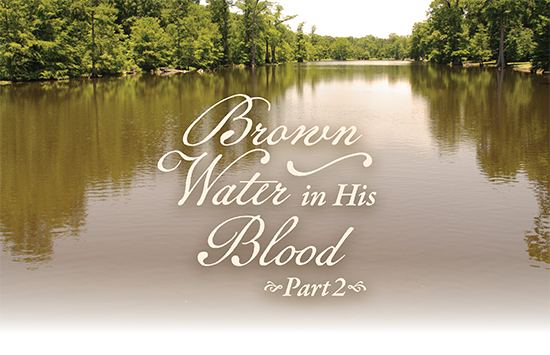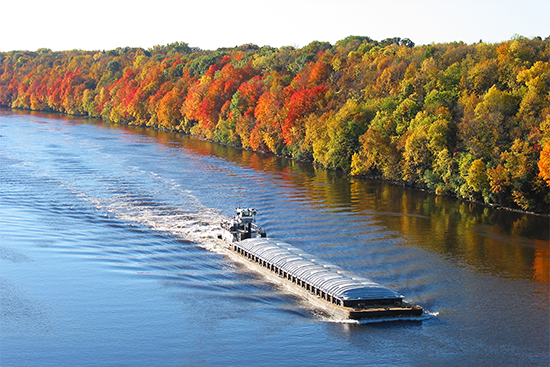
August-
September 2019
Homemade Faith
------------------
|





Brown Water in His Blood, Part 2
By Bill and Brenda Evans
“Call me riverman,” David Smith grinned. When asked if brown water is in his blood, he admits it. “But,” he says, “truth is, river water is usually green, not brown—unless there’s a flood. The Corps of Engineers calls it brown water and oceans blue water, so we do, too.”
After 45 years on brown water, David will talk about anything and everything that has to do with the river. After high school he went on the Ohio River as a towboat deckhand; three years later he became a pilot, then captain, and is now sole owner of River Marine Enterprises, LLC, based in Paducah, Kentucky.
When asked about his business and the rivers he works, David talks first about the people in his life. His wife, Chariot, is at the top of the list. “We’ve been married 31 years, but Chariot says it’s just half that long because I’ve been gone so much. I’m here a while, gone a while—four months one time this year. But Chariot says, ‘I prayed for this, so won’t complain.’ She asked the Lord to give me those hauls, even the long ones.”
David was in his 30s when he and Chariot married. She was in her 20s, settled, had a job, and her own car. “I was already on the river, so she knew what she was getting into. It was 30 days on, 30 off. When I’d been with Ashland Oil for a while and had become a captain, they brought me into the office to manage moving their petrochemicals on the river. I went to work in the morning, came home, ate supper, went to bed, and repeated that. Finally, Chariot said, ‘Why don’t you go get on a boat. We had more time together.’ So I did.”
Chariot’s self-sufficient, not high-maintenance, David said. “She’s in all our church stuff and community Bible study. Has Christian friends and our dog. She’s in two book clubs. We both love to read. She’ll say, ‘Listen to this…’ She wants me to hear how an author says something, the way he writes.”
Chariot has a sense of humor, too, and David likes to laugh. Once he stumbled on his towboat with both hands full, hit his face on the capstan, and looked like he’d been in a bar fight, blood dripping everywhere, broken nose, 24 stitches. When Chariot saw him, she quipped, “At least the dog will still love you.”

Their main home is Flatwoods, Kentucky, but they also rent a house in Paducah, Kentucky, near David’s office. “The house is small. I call it a closet with rooms, but Chariot loves it. Gets housework done in 15 minutes. When I’m home, I cook. She cleans up—says I touch everything in the kitchen, so it’s a job.”
David has friends, both pastors and laymen, in churches in Paducah and other cities on the river. “One church is small, older, and there’s Brother Terry Sills, a retired pastor in his mid-80s, such a pleasure. Reminds me of Bill Little in the Westwood Church at home. Bill’s with the Lord now, but he was a dedicated Christian with a keen sense of humor. Brother Sills is like that. A good man.”
More than 40 years ago, it was the influence of Christian people that wooed David back to the Lord. He was saved at 15, but drifted. A friend invited him to a revival when he was in his 20s. “All I’ve got is blue jeans,” David said. “No problem,” the man answered. So David went—just for one night, he thought. Instead, he was back every night and got right with the Lord. Ed Cook was pastor, and the Worthington twins were the evangelists. The Westwood Church soon became David’s spiritual home. “I was single back then, but two married couples took me in, Ron and Betty Salmon and Bill and Judy Coburn. Been there ever since.”
Christian friends on the river also have helped David spiritually. “I’ve known Captain Dave Dewey for 30 or 35 years. My towboat is named the Captain Dave Dewey after him. Such an amazing man—has a prison ministry, got locked in for 21 days one time. He just doesn’t quit. Another friend on the river saw my Bible duct-taped together and told me he’d help me get a new one. I just said, ‘No, it’s my river Bible. I’ll keep it.’”
David calls the river “a common bond” with both friends and family. “The older I get the more I treasure the time I’ve worked with my family on the river: my dad, two brothers, and grandmother. Dad stayed on as engineer until three weeks before he died at 75. My grandmother was a cook. Three meals a day. Up at 4:00 in the morning, finally in bed at 7:00 that night. She said only one thing worried her on the river—ice. The terrrible noise of it against the barges and towboat unnerved her.”
On the business side, three things stand out for David. First, he has a great business manager, Chris Entrup who runs his office. “She’s a tremendous person. Used to work for Dave Dewey, knows the business, takes care of our accounting, payroll, insurance, invoicing. Everything. She’s very direct. When the men complain, I tell them, ‘I know. She talks that way to me, too. I know who the owner is, but I also know who’s boss.’ She and Chariot are great friends, so I don’t catch a break.”
The second thing David says about the river business is that you find your niche and serve it. Paducah is the modern-day hub of river traffic. From there, towboats serve the Ohio, Tennessee, the Upper and Lower Mississippi, and Missouri rivers. “Recently, we’ve dry-hauled on the Missouri River carrying coal, coal slag that’s left over from power plants and used in asphalt, DDG (distillers dried grains) from ethanol plants used in livestock and poultry feed, corn, soybeans, fertilizer, cement. You name it. This year, during the late winter and spring flooding on the Missouri, we worked the Ohio.”
As far as getting clients, David says their business comes mostly by word of mouth. “It’s a small industry. Everybody knows everybody. We’ll get a call, ‘You got any horsepower available?’ They want a towboat and crew ready to push barges for them by the day or by the ton.”
The third thing David says about the business is to know the river, your towboat, your navigation equipment, and your crew. “That boat is your whole world. You all have to work together, get along, know your job and do it. If you don’t, you have to go.”
But when you talk to David, he always comes back to people. Robert Gray, a longtime Ashland Oil employee over the marine department, was one of David’s “treasures.” Mr. Gray introduced river traffic to the use of radar in the 1940s along with other innovations. “What a brain and heart!” David said. “He had total recall even in his 90s. He’d call—‘Just checking on you,” he’d say in his raspy voice. I’ve been blessed with people. He was one of those treasures. After his death, his son sent me a book. His dad had told him it was important that he get that book to me.”
David is also known as a river historian and singer. “I have a messy collection of books, magazines, photos, etc., going back decades,” he said. He was on the board of governors for the river historical society know as Sons and Daughters of Pioneer Rivermen, and editor of their quarterly magazine called S&D Reflector. David is also a member of an Ashland barbershop choir of 25 men called the Singing Kernels. The pun on their name is intended.
When asked when he might quit brown water and retire, David quipped, “Retire? I’ve heard of it. But river people never really retire.”
About the Writers: Bill and Brenda Evans live in Ashland, Kentucky, along Rockhouse Fork Creek that empties into a larger stream that runs north into the Ohio, an Iroquois word meaning great river. You may contact them at beejayevans@windstream.net.
|
|

